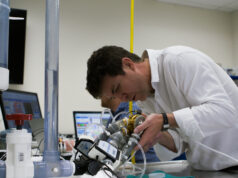On 14 August, Sound Interventions released three-month data from the company’s first-in-human clinical study (SOUND-ITV) to treat resistant hypertension through the use of catheter-based ultrasound.
In addition to office-based blood pressure measurements, patients in the study underwent 24-hour ambulatory blood pressure monitoring prior to the ultrasonic renal denervation procedure, and subsequently three months after the procedure. The office-based blood pressure measurement results showed an average decrease of -25.6/-12.5 mm Hg. Consistent with these results the 24-hour mean blood pressure decreased by -23.1/-11.9 mm Hg.
Patients were treated at Holmolka Hospital in Prague, Czech Republic. Patients enrolled in the study were selected based on a history of hypertension which could not be controlled with medical therapy. The SOUND-ITV study was designed to evaluate the safety and effectiveness of the company’s volumetric dosimetry-controlled application of unfocused ultrasound (patents pending).
“These results demonstrate the ability of Sound Interventions’ ultrasound technology to significantly lower blood pressure in patients whose blood pressure was unable to be controlled by conventional pharmaceutical therapy,” said Petr Neuzil, chairman, Department of Cardiology of Holmolka Hospital.
Vivek Reddy, Mt Sinai Medical Center in New York City who collaborated with Neuzil and who is an advisor to Sound Interventions, commented: “The use of 24-hour monitoring to assess results of renal denervation procedures is a more accurate measurement of effectiveness than office-based blood pressure. The favorable results seen on the ambulatory blood pressure monitoring fortify our confidence in the efficacy of this technology.”
“These results, demonstrate the efficacy of Sound Interventions ultrasound dosimetry-controlled approach to renal denervation. Prior to initiation of the SOUND-ITV study, the company performed extensive in-vitro and in-vivo testing in order to perfect the ultrasound dosimetry. The pre-clinical testing has demonstrated that the Sound Interventions technology is unique in its ability to ablate the target nerve fibers while sparing the arterial wall,” said David Smith, president and CEO of Sound Interventions. “The success of the acute procedures in the SOUND-ITV study, along with these very strong clinical results validate this research and indicate that we are well on the way to developing the state-of-the-art renal denervation technology.”
Results of the SOUND-ITV study will be presented at the upcoming TCT 2012 Conference (Miami, USA, 22–26 October 2012).













